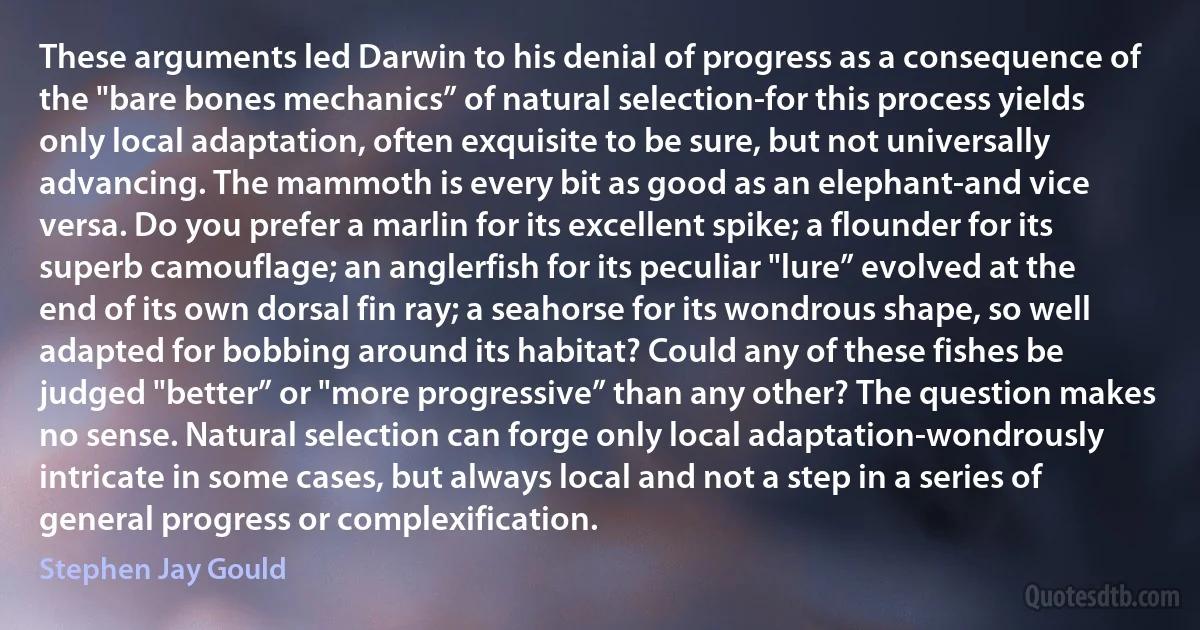
These arguments led Darwin to his denial of progress as a consequence of the "bare bones mechanics” of natural selection-for this process yields only local adaptation, often exquisite to be sure, but not universally advancing. The mammoth is every bit as good as an elephant-and vice versa. Do you prefer a marlin for its excellent spike; a flounder for its superb camouflage; an anglerfish for its peculiar "lure” evolved at the end of its own dorsal fin ray; a seahorse for its wondrous shape, so well adapted for bobbing around its habitat? Could any of these fishes be judged "better” or "more progressive” than any other? The question makes no sense. Natural selection can forge only local adaptation-wondrously intricate in some cases, but always local and not a step in a series of general progress or complexification.
Stephen Jay GouldRelated topics
adaptation advancing bare bit bobbing end exquisite fish flounder general good habitat led mammoth mechanics natural progressive question ray selection sense series spike step sure vice well wondrous bones camouflage darwinRelated quotes
When we approach the study of business cycle with the intention of carrying through an analysis that is truly dynamic and determinate in the above sense, we are naturally led to distinguish between two types of analyses: the micro-dynamic and the macro-dynamic types. The micro-dynamic analysis is an analysis by which we try to explain in some detail the behaviour of a certain section of the huge economic mechanism, taking for granted that certain general parameters are given. Obviously it may well be that we obtain more or less cyclical fluctuations in such sub-systems, even though the general parameters are given. The essence of this type of analysis is to show the details of the evolution of a given specific market, the behaviour of a given type of consumers, and so on.

Ragnar Frisch
The economic betterment of a nation which is at a low level of intelligence and culture, or in which the population is small in relation to the extent and productivity of its territory, is best accomplished through free trade with highly cultivated, rich, and industrious nations. In the case of such a country every restriction of trade, intended to plant manufacturing industry within its borders, is premature and injurious, not only to the welfare of mankind in general, but to the progress of the nation itself. Only when the intellectual, political, and economic education of the nation has so far advanced as a result of free trade that its further progress would be checked and hindered by the import of foreign manufactures and the lack of a sufficient market for its own goods, can protective measures be justified.

Friedrich List
It is natural that I should bear entire responsibility for the war in general, and, needless to say, I am prepared to do so. Consequently, now that the war has been lost, it is presumably necessary that I be judged so that the circumstances of the time can be clarified and the future peace of the world be assured. Therefore, with respect to my trial, it is my intention to speak frankly, according to my recollection, even though when the vanquished stands before the victor, who has over him the power of life and death, he may be apt to toady and flatter. I mean to pay considerable attention to this in my actions, and say to the end that what is true is true and what is false is false. To shade one's words in flattery to the point of untruthfulness would falsify the trial and do incalculable harm to the nation, and great care must be taken to avoid this.

Hideki Tōjō
For nearly five hundred years, these rules and theories of an Arab Shaikh and the interpretations of generations of lazy and good-for-nothing priests have decided the civil and criminal law of Turkey. They have decided the form of the Constitution, the details of the lives of each Turk, his food, his hours of rising and sleeping the shape of his clothes, the routine of the midwife who produced his children, what he learned in his schools, his customs, his thoughts-even his most intimate habits. Islam – this theology of an immoral Arab – is a dead thing. Possibly it might have suited tribes in the desert. It is no good for modern, progressive state. God's revelation! There is no God! These are only the chains by which the priests and bad rulers bound the people down. A ruler who needs religion is a weakling. No weaklings should rule.

Mustafa Kemal Atatürk
Justice is the end of government. It is the end of civil society. It ever has been, and ever will be, pursued, until it be obtained, or until liberty be lost in the pursuit. In a society, under the forms of which the stronger faction can readily unite and oppress the weaker, anarchy may as truly be said to reign, as in a state of nature where the weaker individual is not secured against the violence of the stronger: And as in the latter state even the stronger individuals are prompted by the uncertainty of their condition, to submit to a government which may protect the weak, as well as themselves: so in the former state, will the more powerful factions be gradually induced by a like motive, to wish for a government which will protect all parties, the weaker as well as the more powerful.

Alexander Hamilton
